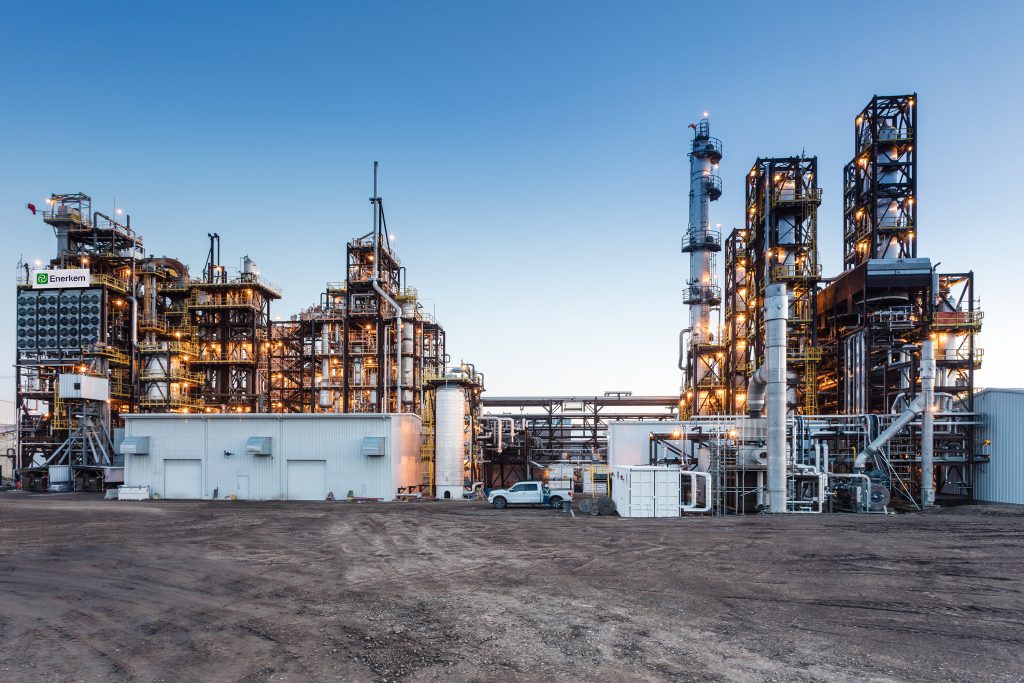
Enerkem receives $5.5M from CRIN Low Emission Fuels and Products Technology competition
February 17, 2022
By Enerkem
 Funding of +CDN$ 5.5M was awarded to the team led by Enerkem’s research and development team based in Edmonton to bring to market its solution to produce low-carbon fuel for the heavy transportation sector. Enerkem’s feedstock flexible gasification technology has been proven in its Enerkem Alberta Biofuels (EAB) facility in Edmonton, Alta. Photo courtesy Enerkem.
Funding of +CDN$ 5.5M was awarded to the team led by Enerkem’s research and development team based in Edmonton to bring to market its solution to produce low-carbon fuel for the heavy transportation sector. Enerkem’s feedstock flexible gasification technology has been proven in its Enerkem Alberta Biofuels (EAB) facility in Edmonton, Alta. Photo courtesy Enerkem. Enerkem, a world leader in the production of biofuels from waste materials, is proud to have received funding as part of the Clean Resource Innovation Network (CRIN) Low Emissions Fuels and Products Technology Competition for its Integration of Advanced Carbon Recycling Technologies to Produce Sustainable Drop-in Fuels in Canada. A grant totaling over CDN$5.5 million is presented to the team, allowing them an opportunity to demonstrate leadership and commitment to meeting ambitious GHG emission reduction targets.
Addressing the decarbonization of the heavy transportation sector
The main objective of the project is to validate a solution that can directly provide low-carbon fuel to the heavy transportation sector, making a significant sustainability impact, while simplifying both the manufacturing process and supply chain requirements.
Technically, the project combines best in class technologies to produce a low-carbon, diesel fuel blend from sustainable feedstock including forestry and agricultural residue and potentially also urban waste, using the Enerkem gasification technology and INFRA’s proprietary catalyst system, while avoiding energy intensive and cost intensive refining and upgrading processes.
From a supply chain standpoint, the team’s solution will provide the ability to produce a liquid fuel that is fully compatible with existing fuel blending, distribution and retail infrastructure. This constitutes an advantage, as the low-carbon fuel could be delivered today using Canada’s existing infrastructure.
“Our project makes a critical link between the agricultural and forestry sectors in that we take waste biomass from these sectors and produce a fuel product that is compatible with the Oil and Gas supply chain. In doing this, we are able to leverage the strength of two of Canada’s strongest industry sectors to drastically diversify and improve the fuel supply of the transportation sector,” mentioned Michel Chornet, Enerkem’s executive vice-president, engineering, innovation and operations.
A novel approach
This major project was led by Enerkem’s research and development team based in Edmonton in collaboration with Suncor Energy and Infra Synthetic Fuels Inc. (INFRA). By combining Enerkem’s feedstock flexible gasification technology (proven in its Enerkem Alberta Biofuels- EAB facility in Edmonton, Alta.) with INFRA’s advanced Fischer-Tropsch technology, the team was able to use the most sustainable feedstocks in a cost-effective process that avoids the cost and energy intensity typically required to upgrade Fischer-Tropsch products to Fuel Grade.
This project will demonstrate the integration of Enerkem’s and INFRA’s technologies at an appropriate scale and will provide critical design information for future commercial deployments. This will pave the way for the first 1,500 BPD waste-derived low-carbon renewable diesel production facility in Canada.
Strong benefits in order to meet Canada’s net zero goals by 2050
Synthetic fuel from waste or biomass-derived syngas could provide a more diversified fuel offering for Canada, driving significant near-term GHG emission reductions and economic diversification. This project will demonstrate the most viable pathways to the most sustainable synthetic fuel.
Anticipated benefits include:
- Commercial deployment of the integrated technologies in Canada by 2030
- Achieving overall 3.3 million tonnes GHG reduction – through the operation of three plants by 2033
- Biofuel production facilities could achieve up to 91 per cent GHG emission reduction
- Creation of more than 700 direct and indirect jobs
Print this page